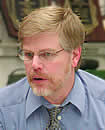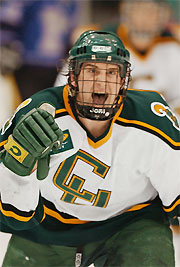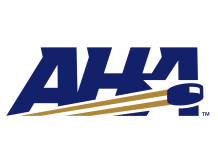Rebuilding. It’s something that tends to happen every once in a while at even the best programs in the nation.
At Clarkson, rebuilding traditionally hasn’t been something which turns into a multi-year project.
“It’s been a tough process for us,” says George Roll, who took the helm in Potsdam following a tumultuous series of events during the 2002-03 season. We’ve certainly gone through some growing pains over the last few years.”
That difficult 2002-03 season had been the first losing campaign at Clarkson in over 25 years, only the third since the creation of the ECAC in 1961, and the first-ever 20-loss campaign. In the wake of controversy after controversy, most focusing on dismissed coach Mark Morris (who’d led the Knights to 10 consecutive 20-win seasons, nine NCAA tournaments, and a Frozen Four in the 1990s), the University hired Roll to guide Clarkson back to its traditional role as dominators, but three more trying seasons were in store for the Clarkson faithful.
Tradition of Excellence
Anyone who takes even a passing interest in the annals of college hockey can tell you that Clarkson boasts one of the richest histories of any program in the nation. Despite never having achieved an NCAA championship, few teams can compare with the tradition of winning that has been constructed on the banks of the Raquette River.

The Knights were the first program in the nation to accrue 1,000 wins, and their all-time winning percentage of .644 is often mentioned as the highest of any team in Division I. The 1955-56 Knights posted an undefeated and untied season (23-0-0) but turned down their first-ever invitation to the NCAA tournament when it was learned that eight of their seniors would not meet NCAA requirements for tournament participation, and the team chose not to play without them.
Clarkson would make tournament appearances the next two years, and after the legendary Len Ceglarski took over in 1958, the Knights returned an additional four times, including appearances in the national championship game in 1962, 1966, and 1970. All told, Clarkson has made 18 NCAA tournament appearances, won the ECAC regular-season title nine times, and won the ECAC tournament on four occasions.
Walker Arena, the Knights’ home from 1939 until 1991, was always a feared destination for visiting teams. It was once said that upon being asked what he’d remember most about college hockey, legendary Cornell goalie Ken Dryden replied “that damn bell at Clarkson,” in reference to Walker’s infamous bell which would sound for every goal scored by the Knights.
And then there are the names. Dave Taylor. Colin Patterson. Craig Conroy. Willie Mitchell. Erik Cole. The list goes on and on. 34 different Clarkson players have been named All-Americans at least once.
The tradition is not lost on the current team by any stretch of the imagination.
“We’ve brought a lot of guys back to come speak with the team over the last couple of years,” says Roll. “They’ve talked about the deep traditions of hockey at Clarkson. One alum even took them on a tour of Walker Arena, where he’d played, and talked about what it meant to wear the uniform.
“It still helps us in areas like recruiting. For a school of our size to have put as many people as we have into the NHL, and the success that those players enjoyed while they were here, it helps us recruit high-profile guys. We don’t have all of the bells and whistles of some of the big programs, but what we’ve got is a pretty good thing.”
Rebirth
Roll’s first three seasons were difficult, to say the least. The Knights went on a magical ECACHL tournament run during his first year behind the bench to ease the memory of a 13-16-5 regular season, but the team failed to earn a home playoff game for the first time since the opening of Cheel Arena. The following season, Clarkson lost a school-record 23 games.
Still, the Clarkson community refused to lose faith in their program and their new leader.
“People were patient,” Roll said of perhaps the most difficult down period in Clarkson’s history. “The administration was patient. They knew there would be a significant period of adjustment but they could see the minor improvements happening even then. But the people who understood the game understood what was going on and were patient with us.”
Last year, the turnaround began, although the luster had not quite been restored. The Knights battled through some rough spots to earn a record above .500 and hosted Princeton for the first slice of March hockey in Potsdam since 2003 before two heartbreaking double-overtime losses at Cornell ended the season.

“The power play was good, and our home record was excellent. The team was improving not only on the ice, but in the classroom. There was a different perception to the team in the community. We started to feel good about ourselves again as a program.”
This year, the turnaround has become official. From the opening game, it was apparent — the Golden Knights were back, and with a vengeance. Clarkson burst out of the gate with only one loss in its first eight games (6-1-1), and offense was plentiful — the Knights were at a blistering 4.88 goals per game, with half of the efforts resulting in six or more goals.
The individual efforts were striking. Steve Zalewski was scoring a goal per game. David Cayer had five goals, Shawn Weller and Chris D’Alvise had four goals apiece, all in just the first eight games of the season.
The Slide
But then, a bump in the road, and the onset of doubt.
Opening the ECACHL home schedule against Princeton and Quinnipiac, the defensive element began to unravel as the Knights were swept at home — a rare occurrence in any season, but something which hadn’t happened since November 2004. Then, it got worse, as Clarkson headed west to take on St. Cloud State and was dismantled. The Huskies outscored Clarkson 11-2 on the weekend.
“St. Cloud certainly took us out of our comfort zone, but our work ethic was awful. We allowed them to do anything they wanted.”
They didn’t return from Minnesota empty-handed, however.
“They exploited our weaknesses, and that was good for us. It made us better as a team, because we realized that we’d reached a point where we were of a mentality that we were going to outscore every team, that we were just going to go out there and rack up the goals. St. Cloud beat us in every facet of the game, and I’m glad it happened, because it’s made us not only better as a team but better as a coaching staff as well in terms of how we approach practice.”
That week, the practice became tougher. Roll and his staff pored over the game tape from St. Cloud and brought the team back to basics, especially with regards to work ethic and defense.
“We outlined the way we expected things to go. The players deserve a lot of credit. They bought into it and realized that they need to play strong defensively as well. They were determined not to let this season slip away from us.”
The Streak
The four-game slide had become a wakeup call, and the Knights responded to the bell just the way Roll had hoped. With strong defense and a new sense of urgency, Clarkson drubbed Bowling Green, Roll’s alma mater, with a convincing 5-0 shutout, and then proceeded to knock off highly-touted Miami.
By the time the Golden Knights were celebrating the Badger Showdown championship victory just a month later, the team had whipped off seven strong wins in a row, and suddenly, defense was the touchstone — Clarkson had a team GAA of 1.29 since its return from St. Cloud, and all of a sudden, the spotlight was right back where it belonged.
“It certainly gave us the exposure that the program’s been looking for. It was a real good weekend for us and you could see the team just come together and take a lot of pride in the way we played — the way we know we can play.”
Now, after two hard-fought ties against league rivals Colgate and Cornell, the Knights are unbeaten in nine straight games, the longest such streak in the country, and that team GAA has fallen even further, with the ninth most-powerful offense in the nation to go with it.
It’s been a team effort, but every team has its stars, and Clarkson is no exception. Juniors Nick Dodge and Zalewski have been instrumental in powering the Knights’ offense, and both have been among the names being murmured in the same breath as “Hobey Baker,” but junior Cayer, sophomore Shea Guthrie, and freshman Matt Beca have been just as important with less hype.
“[Dodge and Zalewski] play both ends of the ice, and all of the little things that they do well are absolutely key. There are a lot of guys out there like that, but there may not be any two guys on the same team as well as they do. We rely on them in every facet of the game. Their numbers may not be up where typical Hobey candidates range, but the success of our team is what is most important to them.”
David Leggio has been the stalwart in net, and one of the more overlooked goaltenders in the nation. His 2.09 GAA and .932 save percentage rank him among the best netminders in the NCAA.
How High?
With the publication of the PairWise Rankings this week, it’s become crystal-clear how much is now expected from Clarkson. Coming in the initial rankings at sixth (ahead of teams like Maine and Colorado College), the Knights are the ECACHL team most likely to be able to command an at-large bid to the NCAA tournament — the next highest-ranked team from the league is Quinnipiac, 11 places back.
Don’t tell George Roll.
“It doesn’t matter what the computers say or what the standings show, we need to come to play every week. We can’t look ahead — that’s what happened when we went out to St. Cloud. All of a sudden, we were getting national attention and getting ranked, and we drop four straight. I don’t think any one of us is ready to look past what we have ahead of us a second time.”
The tradition and dedication are there — and the team knows what must be done to continue its winning ways.
“If we can continue to hold teams to one or two goals a game, I think our offense is good enough that we’ll win some games. Our commitment to team defense is important.”


